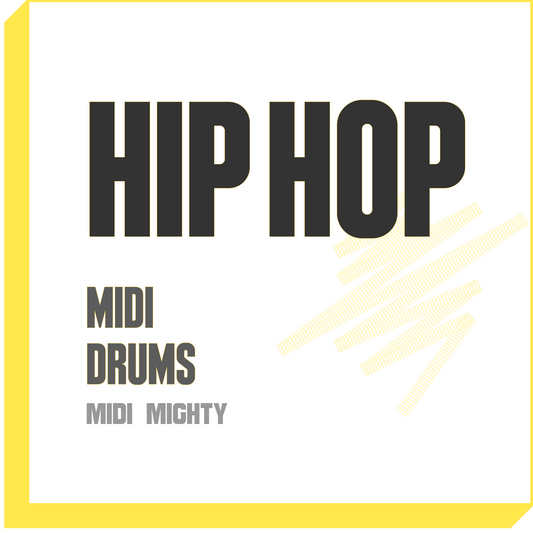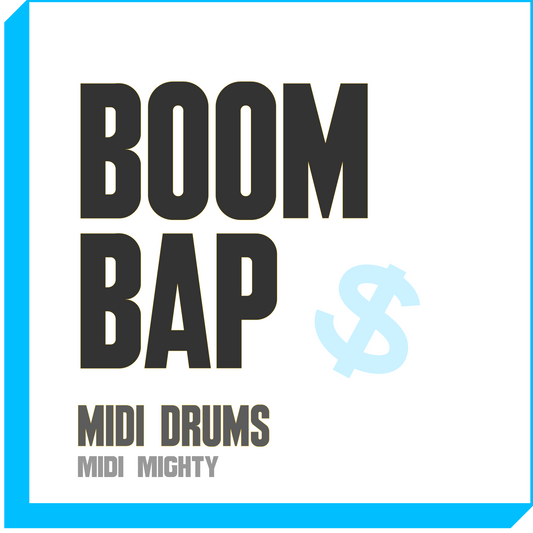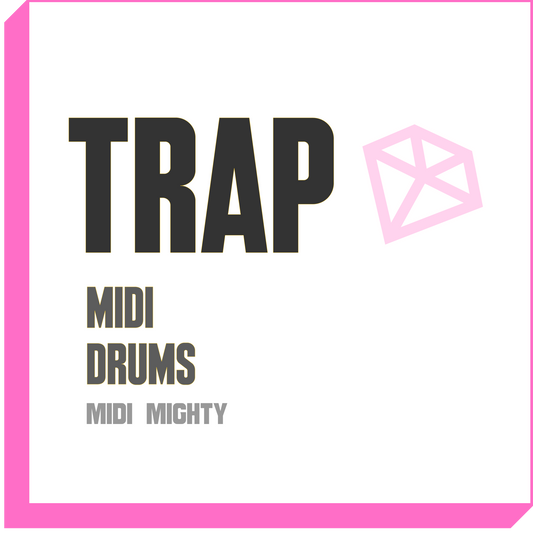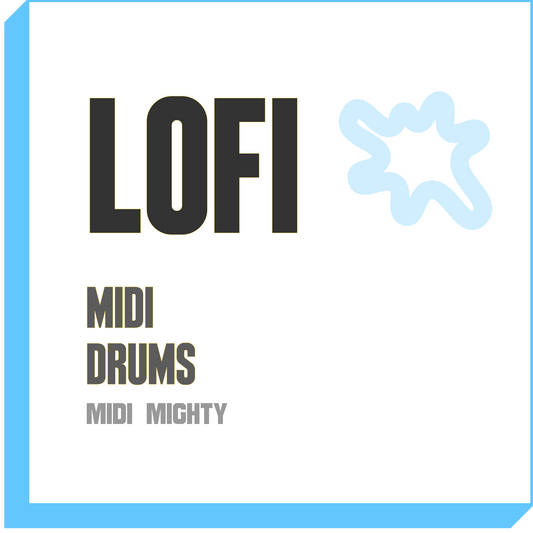Sample packs are super abundant across the web. Many websites sell them, as do independent producers. Even developers of VST’s will sell sample packs. But with a term like “sample pack” it's confusing what is a sample pack. So I put together this article to help you out. Let’s dive in.
Contents:
Sample Pack Overview
Quick Overview of Sampling in HipHop
Sample Pack Types
Construction Kits
A Warning About Construction Kits
What are Loops and Loop Packs?
What are One Shots?
What is A Midi Sample Pack?
Types of Sample Packs
What To Look For In Sample Packs?
Sample Packs overview
A sample pack is a collection of sounds intended for producers to use to produce music. These sounds come in a variety of forms. Many musicians use sample packs as the basis for their tracks. Or to find that one extra sound that takes their track to the next level.
Sounds can be anything from a piano melody, to a someone saying “yooo what’s good!” There usually .wav files but they don’t have to be. Most are short, anywhere from a second or two to a minute or so.
In a nutshell, it;s a folder of sound files. Each folder isn’t random and has a common theme. We’ll get more into the types below. First let’s get into a quick history of the sample.
Quick History of Sampling from a Hip Hop Perspective.
When hip hop first started, producers didn’t have access to huge studios. And they didn't have a plenty of instruments. What they did have were drum machines that could record sounds and play back those sounds. So producers would “sample”, or record snippets of a song, and use that to make something new. That snippet is what we call a sample.
They recorded these samples from vinyl. The vinyl records were stored in crates. That's why you sometimes hear the phrase "digging in the crates".

In a song if there was two seconds a producer thought was interesting they would record that two seconds. That two seconds could be anything, such as a piano melody. That piano loop may become the foundation for a track that producer now makes.
Tracklib does a great job of breaking down sampling. Here's a video of how a producer used samples to make Souls of Mischief's '93 Till Infinity':
So sample packs are a bunch of snippets of existing music?
No. Nowadays producers create sample packs from scratch. So though a producer doesn’t sample an old record. Instead they play melody, some chords, or a riff and that’s what’s called a sample.
Since what they end up with is a short snippet of music it’s still called a sample.
In some cases producers will make a whole song and then take out part of that song as a sample. So in essence, they sample themselves.
Why Would Producers Create Sample Packs?
The benefit of someone creating their own samples is they own the original composition. That allows them sell them as royalty free or give master clearance.
This allows artists to avoid a lot of legal headaches (I talk about this below).
I talked about hiphop so far but it's good to note sampling also was and is a big part of electronic music’s history.
Let’s take a look at some of the types of sample packs, and samples, you see around the web today.
Sample Pack Types - What’s The Difference And What Should I Know
Construction Kits
A construction kit is a set of loops and sounds all designed to work together. The sounds in the kit are in the same key, have the same bpm. They are also based on the same chord structure, song structure, groove, and feeling. All the sounds work together to form a track out of the box. You drag and drop and construct a beat based on the kit and that’s the appeal of construction kits.
So Construction Kits Are Typically Beats?
Yeap.
Often times construction kits are beats broken down into the individual components. So if you have a beat that consists of drums, bass, a piano melody, and guitar licks, in that construction kit, you’ll see:
-song.wav (all the sounds played together)
-Drum.wav (the drums)
-Bass.wav (the bass)
-piano.wav (the piano melody)
Guitar.wav (the guitar riff)
At the least that’s what would be in there. You should also see different variations for the drums, and the piano. The sample pack should include one shots and extra sounds as well. Most of the time these sounds will be in the form of loops.
A warning about construction kits
Often times you’ll see sample packs labeled as “construction kits”. These are a producer's unsold beats. They take a beat, break it down into individual parts, and resell them as “construction kits.” The problem with this as a consumer is you’re buying unsold beats - people didn’t buy them for a reason.
It also means you’re buying overly produced sounds that lock are not flexible. In this case the producer made and mastered the beats with a particular artist in mind. In this case you’re starting with a processed and mastered beat intended for a different artist.
It’s like if you want to make spaghetti and you’re in the market for marinara sauce. There's a pizza seller who baked a pizza but couldn’t sell the pizza. This seller decided to scrape the sauce off the pizza and sell it to you as authentic marinara.
Would you want that marinara sauce for your spaghetti?
What you should look for instead is drum kits and sample packs made without a particular artist in mind. You want a pack with a genre, theme, or mood . These should include stems so you can customize, loops and extra sounds. It also should be part of a larger pack with a similar feel. This can be a particular style of music such as Boom Bap.
What to look for in a construction kit:
- make sure they are not overly processed
- make sure they have plenty of extra sounds so you’re not locked into creating a single sound
- Make sure they come with stems and midi
Going back to our pizza example, it’s like you're buying a “make at home pizza kit”. Imagine the kit only comes with one type of cheese and one flavor of sauce. Well you’re pretty limited with the type of pizza you can make.
You want to make sure it includes many different toppings toppings. All sorts of meats and veggies. Many types of cheeses, and different types of dough. Oh and a variety of sauces. All these ingredients should play well with each other. That way you can quickly create a variety of pizzas, and not recreate the original pizza.
What are Loops?
Loops are the other type of sample packs and are the most popular today. Loops are also found in construction kits. Loops are melodies, chords, chord progressions, or even single sounds. When you play these sounds over and over at a regular timing they create a rhythmic pattern.
Let’s take a look at a loop. Let’s say we have this melody:
Nice, right?
Now we can take that melody and “loop” it over and over and it creates a nice pattern. Let’s take a look and listen at this melody looped:
What are One Shots?
One shots are one-time sounds that have an impact in the entire composition. If a loop or a melody is a sentence, a one-shot is a single word. Usually an emphasized word. This can be a piano stab, or a sound such as a bang.
One-shots can be melodic or not. They're basically not loops, and not drums. It can be a horn stab, a piano riff, or just an interesting sound. It can sounds melodic and have rhythm, or it can be a bit random.
A lot of hip hop uses one-shots.
What Are Midi Samples?
The underlying tech and details around MIDI can get super complex. For sample pack purposes it’s pretty simple. If you ever seen sheet music, that’s what MIDI is, in digital format. It’s tells your DAW what note to play, when, and at what velocity. The great thing about MIDI is it isn’t tied to a particular instrument. You can apply the same MIDI pattern to many instruments.
Types Of Styles of Sample Packs
Sample packs come in all sorts of styles. Here’s the types you’ll find:
Sample Packs Based on Instrument Type
Often you can find sample packs that consist only of a certain instrument like pianos, or flutes.
Vocal Sample Packs
Vocal sample packs are becoming super popular. They’ve been a tricky to pull off in the past. Today, access to proper recording gear and vocalist is easy and low cost. This allows smaller studios to create vocal sample packs.
Drum Kits and Drum Sample Packs
Drum kits, or Drum Sample Packs are super popular for Hip Hop producers. The reason is because they are pretty versatile. They include lots of drums, one shots, fx, and samples. Construction kits can limit you to recreating the beat, sample packs are great if you need just samples, Drum Kits give you the best of everything. They can even come in certain styles such as Boom Bap.
The main reason these are popular for most hiphop beats need to leave room for the rapper’s vocals. So drum kits tend to have more drum sounds, and one shots. They also can include melodies, fx, and samples. Simplified sounds and melodics means the producer emphasizes the drum patterns and drum sounds more.
Sample Packs based on a certain style
If you’re looking for a particular style of music you can find a sample pack for that. Whether it’s hip hop, trap, reggaeton, or Boom Bap Drums, many sample packs come in those styles.
What to look for in sample packs
So you know all about sample packs, but what should you look for when you’re buying a sample pack. Here’s a few items to keep an eye out for:
Stems
Stems are the individual files that make up a sample. Typically the instruments. You want the stems for more creative freedom and to make edits.
So a sample like this:
Is made up of a various synths, strings, a flute, and drums. You want the sample as is, but also all the individual instrument files. Perhaps in this case you love the synths but don’t want the strings with it. A sample pack should provide that separate file as well.
The blended sound is the interesting sound to the producer. Often producers want the stems too so you can make extra edits. So look for those stems.
DRY and WET
This applies to stems but can apply to the sample as well. Sometimes the producer applies effects and processing to the samples. 'Wet' Samples are samples with effects (like reverb) applied to it. If they are, look for ‘dry’ as well. Often times the wet samples sound nice but you always want the dry so you can add your own effects.
It’s ok to get dry or lightly processed samples and stems. These give you the most flexibility. Remember, you’re using these samples to produce music. If you have overly processed sounds to begin with, it’s going to be hard to use those in your new track. Adding reverb or other effects onto a wet sample makes for a poor sounding track.
Quality
Take a listen to the samples provided to get a feel for what you’re going to get. Do the samples sound muddy or too processed? Also look at the details to make sure you’re getting high quality wav files and not mp3s. 24 bit resolution, 44100 sample rate is what you want.
Price
Generally speaking the more product you get per dollar you spend is a good idea. This isn’t true for sample packs. One sample alone can make a sample pack worth the price.
WARNING: In the sample pack industry online you’ll find a lot of sellers package up a lot of samples into a mega bundle. These are low quality samples, samples that don’t sell, beats that don’t sell, rushed samples, or all the above. Yes, you get a great price for the number of samples in the pack. But all those samples are the market already deemed no good, are low quality, or sound terrible. That’s not a lot of value.
You usually see stuff marked as 97% off! Or even 99% off. Buyer beware. You get what you pay for.
From what I’ve seen most sample packs are in the 10 to 60 dollar range for anywhere between 250mb to 1 gb range.
What can you do to avoid buying poor samples?
- Look for brands and labels you bought from before. If you like what you bought chances are you’ll like there other stuff
- Look for brands that have a good reputation (like MIDI Mighty 😉). They usually share good info on social platforms. Are in touch with the community, and post helpful articles like this one.
- Listen to the samples they give. You won’t like all the samples in a pack and that’s ok. A pack can be worth it even if it has one sample in it you like.
- Look for reviews. A good place to start is Google Reviews since they total up the reviews. Do a search and see what comes up.
Quantity
Should you aim for large number of samples each time you buy a sample pack? I say no, but it’s personal preference. Now you should get more than 5 samples but when you have 1000 samples to go through it becomes a lot of work. It sounds nice at the moment. But you’ll get tired of going through listening to the samples, rating each one, and keeping track.
Will Sample Packs Make Me The Next Great Producer?
No. I see a lot of ads claiming this is all you need to be the next hit producer. Sorry it doesn't work like that. You have to but in the time, effort, and work.
If it was as simple as using this sample kit that’s guaranteed to make you blow up, everyone would be a popular producer. Also that person selling it wouldn’t be selling it. They would be blowing up as a producer. Don’t get fooled or scammed.
What sample packs should do is help you create better music faster. They provide a foundation and elements you can use to put together your own unique music. They should enable, and not hinder.
It still take skill to produce a great track even if you use sample packs. If your producing hip hop, try using one of these four hip hop drum patterns.
Usage Restrictions
Legal rights is the most confusing area when it comes to music. For producing beats it can get particularly murky. For sample packs it’s pretty clear. Sample packs should be 100% royalty free. You should have no limits on what you produce with those sample packs.
If you find a sample pack that is not100% royalty free, stay away. To me it’s that simple. Any person/business trying to sell you a sample pack that comes with restrictions is bogus.
Okay one restriction
Most sample packs have one restriction- you can’t resell the individual sounds. And you can't resell the sample pack. This makes a lot of sense for everyone. Artists frown upon reselling samples as your own and hurts the music community.
Don’t be a jerk, use the sample packs as intended - to create music.
What is 100% Royalty Free? Is there such a thing as 50% royalty free
When looking at legal rights, make sure you read the fine print. Some packs are royalty free up until you sell a certain amount - then the owner wants a piece of the pie. My advice is the same here, stay away from these packs.
If you are using a sample from a published piece of work, then for sure restrictions apply. But when you buy a sample pack, there should be no restrictions. Always read the pricing and terms and make sure it’s clear, fair, and transparent pricing.
Does BPM matter?
Yes and no. BPM definitely matters when you made a beat and you’re sending the beat to someone (say an engineer). For samples, it might be helpful to know the original bpm. As an artist might like that sample slower or faster. Mess with the sample to find what you like.
If you buy a kit with samples intended to work together then it helps to know the bpm off all the samples. That way you can set your DAW up the right way.
Does Key Signature matter?
Sometimes. Usually yes, but not always. You want everything you play to sound good together so knowing the key a sample is in will help. Sometimes certain sounds may sound good together even if they are not in the right key. Generally, it helps to know the key the sounds are in.
Where to find sample packs?
MIDI Mightyof course. But if you’re looking for a comprehensive list, we put together the ultimate list of sample packs.
How To Use
Most sample packs consist of .wav files you can drag and drop into your DAW. They should be that easy to use. If you’re getting started, a Beat Pack is a great way to get learn about samples. You can see how they play together and how they all work together.
Why would You Use A Sample Pack
Samples can serve as the foundation of a new music piece. A simple melody or riff can be enough to get a beat started.
They can also serve as the cherry on top. Sometimes all a beat is missing is that simple one-shot sound.
And if you need to guidance on how to lay out drums, check out the Four Essential Hip Hop Drum Patterns Hip Hop Drum Pattern Guide.
All About Sample Packs
That’s the nuts and bolts of sample packs. Hope you found this article useful.
Cole






